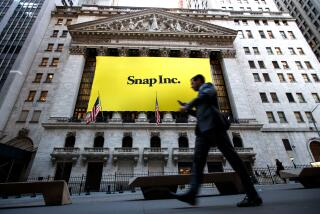Snapple Unit’s Problems Hurt Quaker Earnings
- Share via
CHICAGO — Quaker Oats Co. said Thursday that its Snapple beverages division, hit by disappointing sales, will post a big loss for the current quarter and that it will restructure the maker of iced tea and fruit drinks.
Chicago-based Quaker said Snapple, which it bought a year ago for $1.7 billion, will have about a $55-million operating loss in its fiscal second quarter ending Dec. 31. That will pull Quaker’s overall operating results for the quarter to close to break-even.
Quaker said it will take about a $40-million restructuring charge, largely to improve Snapple’s supply chain. This will result in an expected loss for Quaker of 35 cents to 45 cents a share for Quaker, contrasted with Wall Street expectations of earnings of about 5 cents a share. A year ago Quaker earned $34.4 million, or 25 cents a share.
Snapple’s sales will be about 10% below both last year’s December quarter and the full calendar year, Quaker said--worse than originally projected.
In October, Quaker said Snapple would have a 3% to 5% drop in sales from $670 million in 1994 and post a modest loss for the year.
Quaker, which also makes Gatorade sports drinks, processed food, oatmeal and other cereals such as Cap’n Crunch, defended its year-old acquisition, saying it was poised for growth in 1996.
“1996 will be a different year than 1995 for Snapple,” Quaker spokesman Ronald Bottrell said. “We have made a number of improvements.”
Quaker said the $40-million charge included $30 million to reconfigure manufacturing and supplier contracts and eliminate inefficiencies in Snapple’s distribution.
The remaining $10 million of the charge was related to realigning Quaker’s European beverage and Asian foods businesses. Quaker said it expected the actions will improve the profitability of both businesses. The company’s stock closed at $34.875, down 75 cents, on the New York Stock Exchange.
More to Read
Inside the business of entertainment
The Wide Shot brings you news, analysis and insights on everything from streaming wars to production — and what it all means for the future.
You may occasionally receive promotional content from the Los Angeles Times.









